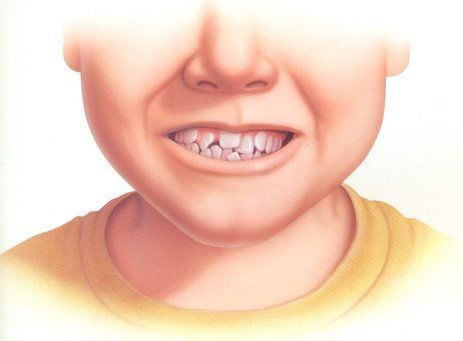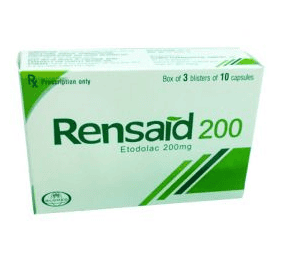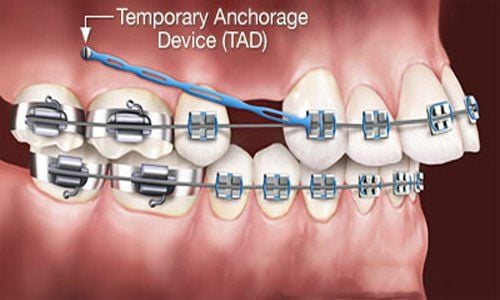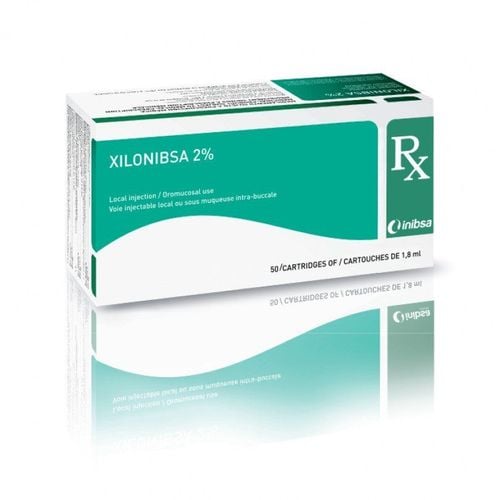This is an automatically translated article.
Pulling out teeth is a problem that many parents wonder when their children are in the age of tooth replacement and suffer from the condition of teeth erupting. This is a phenomenon where the permanent teeth do not have enough space to grow, so they grow inward or outward while the baby teeth still exist on the jaw. So what to do when a child has a toothache?
1.Causes of teething in children
Some causes of teething in children:
Genetics: This is a factor that cannot be changed from close family members such as grandparents and parents. When these people have crooked or crowded teeth, there is a high chance that children will also have them. Baby teeth remain for too long on the jaw and are not extracted at the right time, leading to the permanent teeth replacing it without a place to erupt. As a result, the permanent teeth will either erupt inward or outward. The length of the jaw is too narrow, so the teeth do not have enough room to arrange them regularly, so they must grow out of the arch. Children with bad habits such as biting pens, sucking fingers, sucking bottles are also common causes for permanent teeth to erupt inwards. In addition, children are very susceptible to injuries such as falls or bumps that cause strong forces on the jawbone due to their hyperactive nature, which can affect the permanent tooth germ, causing the teeth to grow out of alignment. way.
2. What are the consequences for the child's teeth?
In terms of aesthetics and psychology: The age of teeth replacement is also the time when children start going to school and interacting with teachers and friends. When there are crooked teeth on the mouth, it will affect psychologically and make them feel inferior and less integrated. In terms of chewing function: Overgrown teeth will reduce chewing efficiency and affect digestion somewhat. In addition, crooked, crowded teeth are an opportunity to deposit food debris, difficult to clean teeth, increase the risk of tooth decay and gingivitis.
3. Teeth erupting, what to do to prevent?
Determine the exact time the child changes teeth: Children begin to replace their first tooth at the age of 6 and this process will last throughout the period from 6 to 12 years old. The lower milk incisors will be replaced first and then the upper milk incisors and then the baby molars. Periodic dental check-ups: When children enter the age of tooth replacement at the time of entering grade 1, parents should have their children visit a dentist every 3-6 months. Regular visits help the doctor assess the child's tooth replacement status and extract the teeth that are ready to be replaced so that the permanent teeth can erupt in the correct position. Monitor children's oral health regularly: Once you know the age and order of baby teeth, parents also need to monitor their children's oral health regularly. When seeing a loose tooth that is about to be replaced, remind the child to voluntarily use his fingers to gently apply pressure often so that these teeth have enough wiggle room to make the extraction of baby teeth easier. When it is wobbly enough to spit, the parent can easily remove it or take the child to the dentist to have it extracted. Going to the dentist and having a tooth extracted will help you get a better overview of your oral health and get the right advice to deal with future problems.
4.Children with teething, what to do?
Depending on the degree of protrusion and the condition of the teeth on the arch, the dentist will decide whether to put the teeth back into the correct position or not. Some of the interventions that can be applied to help your baby have beautiful teeth include:
Remind the child to practice tongue thrusting to help return the teeth to the correct position. Making this action easy by instructing the child to use the tip of the tongue to push against the crown of the misaligned tooth many times on a regular basis is extremely effective. However, it should be noted that, if the habit of pushing the tongue is excessive and prolonged, a protrusion of teeth may appear. Therefore, it is necessary to supervise the child regularly until the tooth is neatly placed on the jaw, then it is required not to push the tongue anymore. In case the teeth cannot be returned to the correct position by pushing the tongue, the doctor can choose to intervene with orthodontic appliances at an early stage. The appliance of choice can simply widen the jaw, helping the child's arch to widen so that the teeth can erupt into the desired position. This is important, if the use of the tongue to push the teeth fails. If timely intervention is not carried out, it can make the upper jaw bone develop poorly, and at the same time, the lower jaw bone protrudes leading to occlusal disorders and has a great impact on aesthetics, but later on, the underbite face is difficult to correct. overcome. If after the age of 12, there is still a situation of misaligned teeth crowded on the child's jaw, parents should bring the child to braces early. Because through this stage, the baby teeth have been replaced, so the misaligned teeth cannot return to the correct position by themselves, but early orthodontic treatment is required to arrange the teeth regularly, helping children have strong teeth and smile. Natural beauty. In orthodontics, you can use a widening appliance and also use brackets attached to your teeth to help move your teeth. Many parents think that waiting for their child to grow up to go to college and then orthodontic treatment later, but orthodontic treatment after completing the tooth replacement process, like bending a young tree, will be much gentler and more effective. . Depending on the degree of protrusion and the condition of the teeth on the arch, the dentist will decide whether to put the teeth back into the correct position or not. Therefore, parents need to pay attention to observe if the child's teeth are not in the right position, they need to take the child to the dentist as soon as possible, and at the same time do it on a regular basis to help the child have strong, white teeth.
Vinmec International General Hospital is the address for examination, treatment and prevention of diseases, including the specialty of Odonto-Stomatology. When performing the examination process at Vinmec, customers will be welcomed and used modern facilities and equipment along with perfect medical services under the guidance and advice of experts. Good doctors, well-trained both at home and abroad. Therefore, when there are signs of crooked, misaligned, crowded teeth that make the baby uncomfortable and greatly affect the aesthetics, parents can take the child to Vinmec for examination and intervention.
Please dial HOTLINE for more information or register for an appointment HERE. Download MyVinmec app to make appointments faster and to manage your bookings easily.













